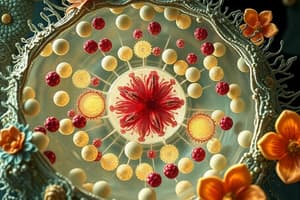Podcast
Questions and Answers
What makes plant cells different from animal cells?
What makes plant cells different from animal cells?
- Plant cells undergo the process of cell division
- Plant cells have cell wall (correct)
- Plant cells have cell membrane
- Plant cells contain different organelles responsible for cellular activities
What can you conclude about a specimen with a cell wall and various organelles?
What can you conclude about a specimen with a cell wall and various organelles?
- It belongs to a bacterial cell
- It's hard to tell, unless other cell parts are also mentioned
- It is an animal cell
- The characteristics belong to a plant cell (correct)
Which statement about the nucleus is the exception?
Which statement about the nucleus is the exception?
- It contains the genetic material
- It is a dense body inside the cell that holds the DNA for inheritance
- It is the control center of the cytoplasm (correct)
- It controls all metabolic and cellular activities
Which organelle is unique within an autotrophic, eukaryotic cell?
Which organelle is unique within an autotrophic, eukaryotic cell?
Based on the tenets of the cell theory, which does not belong to the group?
Based on the tenets of the cell theory, which does not belong to the group?
Explain the postulates of the cell theory.
Explain the postulates of the cell theory.
Describe the structure and function of major and subcellular organelles.
Describe the structure and function of major and subcellular organelles.
Trace the historical development of the cell leading to cell theory.
Trace the historical development of the cell leading to cell theory.
Determine the structure and function of the cell.
Determine the structure and function of the cell.
What does the term 'bio' mean in Greek?
What does the term 'bio' mean in Greek?
What is the branch of natural science dealing with the study of life?
What is the branch of natural science dealing with the study of life?
Viruses are classified as living organisms.
Viruses are classified as living organisms.
What is not a characteristic of life?
What is not a characteristic of life?
Flashcards are hidden until you start studying
Study Notes
Plant and Animal Cells
- Plant cells have a rigid cell wall, while animal cells do not.
- Both types of cells have cell membranes, undergo cell division, and contain various organelles.
- The presence of a cell wall and specific organelles indicates a plant cell from observed characteristics.
Nucleus
- The nucleus contains genetic material (DNA) and acts as the control center for cellular activities.
- It regulates metabolic functions and cellular processes.
- An incorrect statement about the nucleus is that it controls the cytoplasm, which is not accurate.
Unique Organelles
- Chloroplasts are unique to autotrophic eukaryotic cells, enabling photosynthesis.
- Other organelles such as chromatin, cytoplasm, and cell membranes are not exclusive to this cell type.
Cell Theory
- All living organisms (animals, plants, bacteria) are composed of cells.
- Viruses are not classified within this group as they do not fulfill the criteria of living organisms.
History and Study of Cells
- Cell theory is rooted in the historical development of understanding cells as basic life units.
- Major organelles include the nucleus, mitochondria, and chloroplasts, each serving specific functions for cell activities.
Characteristics of Life
- Seven essential traits describe living organisms: organization, reproduction, response to stimuli, homeostasis, growth and development, adaptation, and metabolism.
- Organization is foundational, beginning at the cellular level.
- Reproduction can occur via sexual or asexual means, such as mitosis.
- Sensitivity allows organisms to react to environmental stimuli.
- Homeostasis refers to maintaining internal balance despite external changes, exemplified by physiological responses like sweating.
Nature of Viruses
- Viruses exist in a "gray area" between living and non-living as they do not exhibit independent replication or self-maintenance.
- They play a crucial role in biological processes and evolution despite not being classified as living organisms.
Types of Cells
- Distinction between prokaryotic cells (single-celled) and eukaryotic cells (can be unicellular or multicellular).
- Unicellular organisms consist of a single cell, whereas multicellular organisms contain numerous specialized cells.
Branch of Biological Sciences
- Biology, derived from Greek words for “life” and “study,” encompasses various disciplines including botany, microbiology, and genetics.
- Each branch focuses on specific aspects of living organisms and their interactions within ecosystems.
Studying That Suits You
Use AI to generate personalized quizzes and flashcards to suit your learning preferences.




